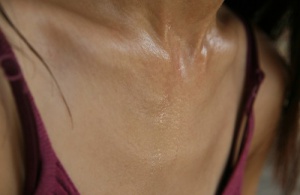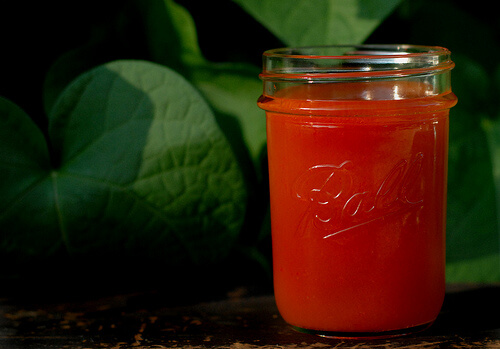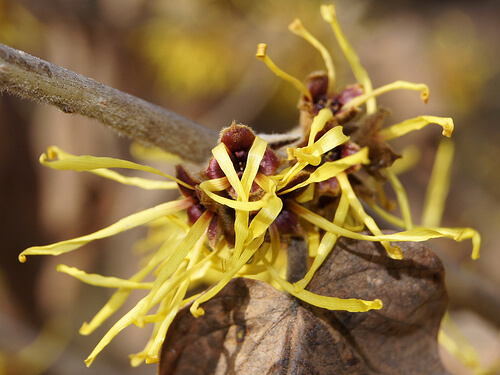How to Control Heavy Sweating

Hyperhidrosis, or heavy sweating, is a disorder that greatly affects the quality of life of people who suffer from it.
Sweating is a natural action of a healthy body because it controls the body’s temperature and liquid. However, when it’s excessive, it isn’t beneficial for your health and it can also highly determine a person’s activity.
In this article, we’ll take a look at some remedies for excessive sweating, a problem that affects nearly 3% of people.
When You Sweat Too Much
Sweat is created in the sudoriparous glands and is excreted via skin pores with the objective of cooling the skin. This is why it has a necessary function for your thermal equilibrium and also for eliminating excess fluids from the body.
In some cases, however, the glands are too active and produce sweat although the body doesn’t need to be cooled. That’s when heavy sweating occurs.
This can be due to, in the first place, hereditary factors, but there are also some medications and imbalances that can cause it. In addition, changes in the nervous system like stress, anxiety, or emotional tension can also increase sweating.
It’s important to watch out for food that contributes to heavy sweating. Also, be aware that there are some antiperspirant products on the market that are not recommended at all for your health. This is because they completely cut off the way to eliminate toxins from the body that, if closed off, can cause illness in the long run.
Remedies for Heavy Sweating: A Proper Diet
Spices like cayenne pepper, pepper, and ginger increase the body’s temperature and, as a result, the amount of sweat. They’re used precisely to lower fevers because they make you sweat.
However, in this case, if you suffer from heavy sweating, you should try to avoid them as much as possible.
You should also avoid very hot food and drinks.
Thirdly, foods rich in iodine are not a good idea either because they can make the problem worse.
These include:
- Broccoli
- Asparagus
- Onion
- Garlic
It’s also important to avoid heavy meals in general. They cause stress for your body and can increase sweating.
On the other hand, eating astringent food is good for you, like:
- Tea
- Lemon
- Acerola
- Berries
- Quince
- Tomato
In regards to tomatoes, you can make gazpacho or tomato juice to drink everyday.
You might like: 6 Medical Causes of Night Sweats
Salvia
Salvia contains vitamin B, which helps reduce the activity of the sudoriparous glands and therefore sweating.
You can drink it in an infusion or as an extract, or even include it in baths. You can also eat salvia leaves in salads, sauces, or in batters as well.
Lastly, its essential oil is found in many natural deodorants, which is why you can also apply it in small drops directly to your skin or even make your own natural deodorant.
Lycopodium Spores
Lycopodium spores, also known as vegetable sulfur, absorb sweat as they stop the proliferation of bacteria that causes bad odor. They can also prevent irritation and rashes that may appear.
Apply every morning and night to the areas that have more transpiration. Avoid any open wounds.
Read: 5 Tricks to Remove Sweat Stains from Clothes
Red Clay Baths
At least once a week, you can take a hot bath with red clay powder. The clay absorbs toxins from your body and the bath will also help you relax your nervous system.
- Put five tablespoons in the bath and bathe for a half an hour.
- After, rinse yourself with cold water.
Witch Hazel Water
Witch hazel has an astringent action that reduces excessive transpiration and leaves your skin clean and dry. You can find witch hazel water in herb stores.
Spray your body with it before getting dressed and also when you notice excess sweating. It’s an excellent remedy for fighting facial sweating, for example.
Final Advice
To conclude, we also recommend that you wear clothing made with natural, breathable fabric, like cotton, that is loose-fitting so that it allows you to breathe.
Also, don’t forget that people that suffer from heavy sweating lose a lot of liquids. That is why it’s important to drink water throughout the day, especially between meals.
All cited sources were thoroughly reviewed by our team to ensure their quality, reliability, currency, and validity. The bibliography of this article was considered reliable and of academic or scientific accuracy.
- Margarita Chávez. Belleza al natural: Recetas a base de ingredientes naturales para cuidar la piel y el cabello. Penguin Random House Grupo Editorial México, 2017.
- Jean Carper. Los alimentos medicina milagrosa. Editorial AMAT, 2012.
- Gloria García, Alimentos Que Ayudan a Prevenir y Combatir Enfermedades. Palibrio, 2012.
This text is provided for informational purposes only and does not replace consultation with a professional. If in doubt, consult your specialist.











